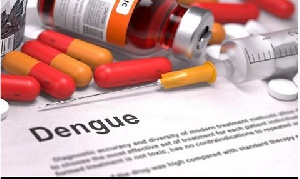 Ghana's risk of an outbreak of dengue fever is high due to its proximity to Burkina Faso
Ghana's risk of an outbreak of dengue fever is high due to its proximity to Burkina Faso
Ghana has enhanced its health surveillance and initiated precautionary measures against the outbreak of dengue fever, a mosquito-borne tropical disease that causes high fever and joint pains among others, in Burkina Faso.
An alert issued by the Ministry of Health said although there is no evidence of a recorded dengue case in Ghana, the country’s risk is high due to its proximity to Burkina Faso and the high density of the mosquito vector that causes the disease.
As at November 12, 2016, a total of 1,061 probable (Dengue Rapid Diagnostic Test (RDT) positive) cases out of 1,266 suspected cases reported in Burkina Faso with a cumulative total of 15 deaths (CFR 1.2%).
“In this regard, there is the need to enhance surveillance and increase awareness among the health staff and general population to prevent, protect against, early detect and appropriately respond to cases,” the alert signed by Health Minister Alex Segbefia stated.
Earlier a similar alert issued by the Western Regional Health Directorate of the Ghana Health Service advised all health facilities within the region to update their preparedness and response plans for the disease.
It also asked them to in the event of a reported suspected case, sample blood and send to the Noguchi Memorial Institute for Medical Research in tripple package protection for laboratory analysis. What is dengue fever? Dengue is an acute fever caused by a virus.
It occurs in two forms namely: 1. Dengue Fever: presents as febrile illness marked by sudden onset of high grade fever, severe headache and pain behind the eyes, muscles and joints. 2. Dengue Haemorrhagic Fever (DHF): is a more severe form. In addition to above, there is bleeding and sometimes shock occurs, leading to death.
It is most serious in children. Symptoms of bleeding usually occur after 3-5 days of fever.
• The high fever continues for five to six days (39-40 Degrees Celsius). It comes down on the third or fourth day but rises again. The patient feels much discomfort and is very weak after the illness. Dengue spreads rapidly and may affect large number of people during an epidemic resulting in reduced work productivity, but most importantly causing the loss of lives. Signs and symptoms
• Sudden onset of high fever
• Severe headache (mostly in the forehead)
• Pain behind the eyes which worsens with eye movement
• Body aches and joint pains
• Nausea or vomiting Mode of spread Spread of Dengue fever is through the bite of infected Aedes aegypti mosquito. The mosquito gets the virus by biting the infected persons. The first symptoms of the disease occur about 5-7 days after an infected bite.
It is impossible to tell if a mosquito is carrying the dengue virus. Therefore, people must protect themselves from all mosquito bites. The Aedes mosquito rests indoors, in closets and other dark places. Outside, they rest at cool and with shade. The female mosquito lays her eggs in water containers in and around homes, schools and other areas in towns or villages.
These eggs become adult in about 10 days. Aedes mosquitoes breed in stored exposed water collections and conditions that favour breeding places are as follow: Barrels, drums, jars, pots, buckets, flower vases, plant saucers, tanks, discarded bottles, tins, tyres, water cooler, etc. and a lot more places where rain- water collects or is stored.